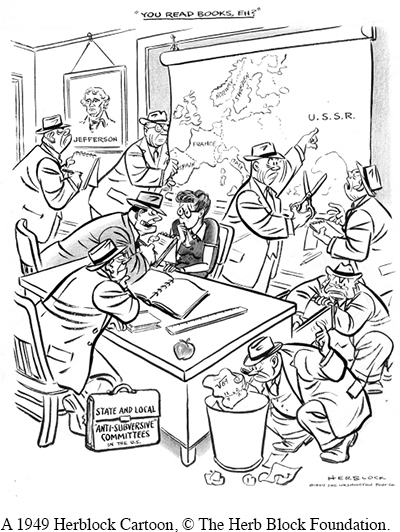The American Promise: Printed Page 762
The American Promise, Value Edition: Printed Page 690
The American Promise: A Concise History: Printed Page 789
The Domestic Chill: McCarthyism
Truman’s domestic agenda also suffered from a wave of anticommunism that weakened liberals. “Red-
The American Promise: Printed Page 762
The American Promise, Value Edition: Printed Page 690
The American Promise: A Concise History: Printed Page 789
Page 763Republicans jumped on events such as the Soviet takeover of Eastern Europe and the Communist triumph in China to accuse Democrats of fostering internal subversion. Wisconsin senator Joseph R. McCarthy avowed that “the Communists within our borders have been more responsible for the success of Communism abroad than Soviet Russia.” McCarthy’s charges—

Revelations of Soviet espionage lent credibility to fears of internal communism. A number of ex-
Records opened in the 1990s showed that the Soviet Union did receive secret documents from Americans that probably hastened its development of nuclear weapons by a year or two. Yet the vast majority of individuals hunted down in the Red scare had done nothing more than at one time joining the Communist Party, associating with Communists, or supporting radical causes. And nearly all the accusations related to activities that had taken place long before the Cold War had made the Soviet Union an enemy.
The hunt for subversives was conducted by both Congress and the executive branch. Stung by charges of communism in the 1946 midterm elections, Truman issued Executive Order 9835 in March 1947, establishing loyalty review boards to investigate every federal employee. “A nightmare from which there [was] no awakening” was how State Department employee Esther Brunauer described it when she and her husband, a chemist in the navy, both lost their jobs because he had joined a Communist youth organization in the 1920s and associated with suspected radicals. Government investigators allowed anonymous informers to make charges and placed the burden of proof on the accused. More than two thousand civil service employees lost their jobs, and another ten thousand resigned as Truman’s loyalty program continued into the mid-
Congressional committees, such as the House Un-
The American Promise: Printed Page 762
The American Promise, Value Edition: Printed Page 690
The American Promise: A Concise History: Printed Page 789
Page 765The Truman administration went after the Communist Party directly, prosecuting its leaders under a 1940 law that made it a crime to “advocate the overthrow and destruction of the [government] by force and violence.” Although civil libertarians argued that the guilty verdicts violated First Amendment freedoms of speech, press, and association, the Supreme Court ruled in 1951 that the Communist threat overrode constitutional guarantees.
The domestic Cold War spread beyond the nation’s capital. State and local governments investigated citizens, demanded loyalty oaths, fired employees suspected of disloyalty, banned books from public libraries, and more. College professors and public school teachers lost their jobs in New York, California, and elsewhere. (See “Experiencing the American Promise: An Immigrant Scientist Encounters the Anti-Communist Crusade.”) Because the Communist Party had helped organize unions and championed racial justice, labor and civil rights activists fell prey to McCarthyism as well. African American activist Jack O’Dell remembered that segregationists pinned the tag of Communist on “anybody who supported the right of blacks to have civil rights.”
The American Promise: Printed Page 762
The American Promise, Value Edition: Printed Page 690
The American Promise: A Concise History: Printed Page 789
Page 766McCarthyism caused untold harm to thousands of innocent individuals. Anti-
REVIEW Why did Truman have limited success in implementing his domestic agenda?